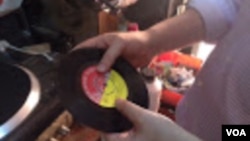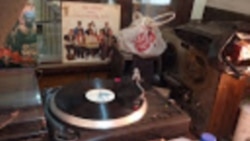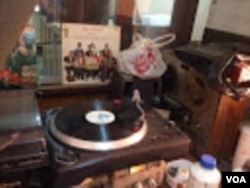A dusty music store in downtown Nairobi was once the hotspot for East African musicians recording music with influences from across the region. While the shop suffered with the introduction of CDs and MP3s, a renewed interest in vinyl records is bringing back the music and the customers.
Abdul Karim, the owner of the Melodica music store in downtown Nairobi talks and plays music for a visitor.
In the back of his shop with a pile of old 45 RPM records, he slips on a pair of glasses to better read the information about a recording.
“This is a band called Olonde family band, there you go, there is the influence of family or whatever. And the song is called 'Musa Omondi.' It’s probably the name of some politician. As the music starts to play, he said, "It’s actually on the Melodica label so it really looks good when it’s spinning.”
Melodica's rich history
Founded by Karim's father in 1971, Melodica recorded tons of musicians from Kenya, Tanzania and Congo during its heyday.
The recordings that remain reveal a melting pot of different musical traditions and influences.
“Some of these guys, they just learned enough how to play guitar basically on their own without any education in that, and then they just come up with their own kind of beats and then say, ‘All right, we’re going to go and sell a goat and head off into Nairobi and go find a recording music store,’ and bam, they would be at the store entrance playing their guitars, trying to impress. It was really amazing,” he said.
Throughout the 1970s and ‘80s, Karim says the store was packed with musicians as people crowded the sidewalks outside the store, listening to the music being pumped out on to the streets.
Then came the 1990s. As cassettes and CDs replaced records, the last vinyl pressing plant in Nairobi closed down.
As families sold off or threw out their record players, music recorded at Melodica and other stores was locked away on vinyl disks.
But the dry season for vinyl may be coming to end.
Turntables spin again
In stall number 570 at Nairobi’s Kenyatta market, amid the smoky haze of roasted meat, James Rugami has been selling records since 1989.
Customers flit in and out as a Congolese record spins on the turntable.
“Eight years ago, there were people who thought I was crazy," said Rugami. "They would come over and have a look and say, what are you keeping these for? But today they are coming back and appreciating. I’m so happy because it’s even very very young people.”
Rugami is seeing a vinyl renaissance in Kenya. He said his sales have been up by 40 percent over the past two years.
"The day before yesterday, I served two very interesting girls. One told me she came from Canada and the other was from Seattle, Washington. One was 19 and the other one was 17. They knew what they were looking for,” he said.
High demand
And what kind of records are his customers looking for?
“African. No question about that. African, especially from guys across the borders, they’re looking for African and the older the better,” he said.
Both Rugami and Karim say they are making contact with people all over the world who are looking for African records.
Facebook groups have formed in Kenya, and enthusiasts have started holding monthly listening parties.
Karim has even started ordering new turntables from China to help satisfy the growing demand.
And slowly but surely, the old sounds of East Africa are rising from the past.








